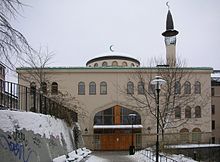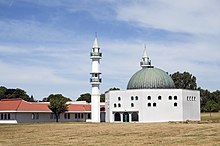Our website is made possible by displaying online advertisements to our visitors.
Please consider supporting us by disabling your ad blocker.
Islam in Sweden
This article has multiple issues. Please help improve it or discuss these issues on the talk page. (Learn how and when to remove these messages)
|


| Islam by country |
|---|
 |
|
|
Swedish contact with the Muslim world dates back to the 7th–10th centuries, when the Vikings traded with Muslims during the Islamic Golden Age. Since the late 1960s and more recently, Muslim immigration from the Middle East, Balkans and Horn of Africa has impacted the demographics of religion in Sweden, and has been the main driver of the spread of Islam in the country.[2] Islam in Sweden increased at most as a result of high refugee influxes, notably during the Yugoslav Wars and the Somali Civil War in the 1990s, Iraq War in the 2000s and Syrian civil war in the 2010s.[3][4]
The Muslim community in Sweden hails from numerous countries, making it a complex and heterogeneous population.[5] According to a 2019 report from the Swedish Agency for Support to Faith Communities, there were 200,445 Muslims in Sweden who practiced their religion regularly; this count came from those registered with Islamic congregations.[6] The US Department of State's Sweden 2014 International Religious Freedom Report set the 2014 figure of Muslims in Sweden at around 600,000 people, 6% of the total Swedish population.[7] A 2017 Pew Research report documents Sweden's Muslim population at 810,000 people, 8.1% of Sweden's total population of 10 million people.[8]
- ^ "Muslim Population Growth in Europe Pew Research Center". 2024-07-10. Archived from the original on 2024-07-10.
- ^ Larsson, Göran (2014). Islam och muslimer i Sverige – en kunskapsöversikt (PDF). Stockholm: Swedish Agency for Support to Faith Communities (SST). p. 41. Archived (PDF) from the original on 2018-07-03. Retrieved 2018-09-01.
- ^ Ingrid Eckerman, Karin Fridell Anter, ed. (2021). Den onödiga flyktingkrisen. Rättssäkerheten, civilsamhället och flyktingarna 2015–2021. Migra & Stöttepelaren. pp. 50, 483. Retrieved 2022-05-14.
- ^ Willander, Erika (2019). Sveriges religiösa landskap – samhörighet, tillhörighet och mångfald under 2000-talet (PDF). p. 35. Archived from the original (PDF) on 2022-04-20. Retrieved 2022-05-14.
- ^ Larsson, Göran (2009-05-07). Islam in the Nordic and Baltic Countries. Routledge. ISBN 978-1-134-01291-6.
- ^ "STATISTIK 2019" [Number of people served at registered religious congregations which are entitled to government support]. Swedish Agency for Support to Faith Communities. Archived from the original on 2019-04-17.
- ^ International Religious Freedom Report 2014 : Sweden Archived 2019-08-08 at the Wayback Machine, U.S. Department Of State.
- ^ Hackett, Conrad (29 November 2017). "5 facts about the Muslim population in Europe". Pew Research/Fact Tank. Pew Research Center. Archived from the original on 17 August 2018. Retrieved 12 December 2017.
Previous Page Next Page



